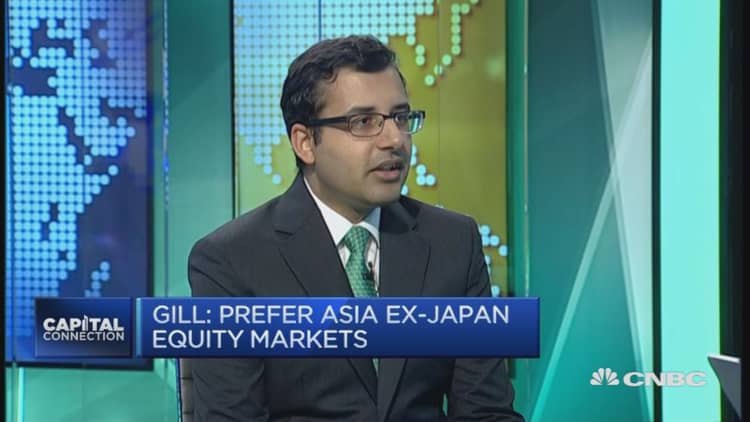


Markets in Asia ended mixed on Friday, as traders continued to digest announcements from the U.S. Federal Reserve and the Bank of Japan (BOJ).
The in Japan closed down 53.60 points, or 0.32 percent, at 16,754.02. The Topix slipped 3.11 points, or 0.23 percent, to 1,349.56 on Friday.
Japanese markets were shut on Thursday for a public holiday after climbing nearly 2 percent Wednesday when the BOJ announced an overhaul of its monetary policy framework.
Chinese mainland markets traded lower, with the composite closing down 8.51 points, or 0.28 percent, at 3,033.79, while the Shenzhen composite fell 10.04 points, or 0.5 percent, to 2,008.12.
In Hong Kong, the was down 0.34 percent in late-afternoon trade, while South Korea's Kospi index finished up 4.37 points, or 0.21 percent, at 2,054.07.
Australia's benchmark ASX 200 beat regional peers to finish up 56.84 points, or 1.06 percent, at 5,431.30, with the heavily-weighted financial sector gaining 1.15 percent. The gold sector, however, dropped 2.08 percent. For the week, the ASX 200 posted a 2.5 percent gain.
Markets searched for direction during trading hours on Friday, in part due to the lack of any major data releases in the economic calendar. Sentiment in markets next week will likely be dominated by the first U.S. Presidential Debate taking place on Monday.
"After a week of key risk events, Friday brings a breather to markets, with little in the way of significant data flow," said Tapas Strickland, an economist with the National Australia Bank (NAB).
Strickland added that the global rally in risk assets and bonds seen Thursday was likely due to markets interpreting Wednesday's Federal Open Market Committee statement as more on the dovish side.
"[Central banks] want higher growth and more inflation ... they don't want to upset things, given uneven and fragile global growth," said Shane Oliver, head of investment strategy and chief economist at AMP Capital.
He added that global monetary policy was set to remain "easy for some time yet," meaning a positive environment for shares and growth assets, not taking into account short-term even risks.
Putting some pressure on Japanese stocks on Friday was a relatively high yen, which traded as high as 100.67 against the dollar, compared with levels above 102 on Wednesday before the Fed's policy decision. At 2:48 p.m. HK/SIN, the dollar/yen traded at 100.78.
Major Japanese export stocks were mixed, with Toyota finishing down 3.16 percent and Honda slipping 2.37 percent. Meanwhile, Nissan added 0.98 percent and Sony shares gained 0.8 percent. A stronger yen tends to weigh on exporters as it reduces the value of overseas earnings when they are translated back into their home currency.
Many Japanese banking stocks also closed down more than 1 percent each, with investors likely taking profits after shares rallied on the back of the BOJ's decision to not cut interest rates further into negative territory on Wednesday. Negative interest rates affect the profit margins of banks.
Mitsubishi UFJ closed down 1.54 percent, SMFG was down 1.63 percent and Mizuho Financial fell 1.93 percent.
In the currency market, the dollar index, which measures the greenback against a basket of currencies, traded at 95.418, a touch higher than levels near 95.410 reached Thursday afternoon Asia time. That compared with levels over 96 before the Fed decision.
Meanwhile, the Australian dollar traded nearly flat at $0.7647 as of 3:02 p.m. HK/SIN, compared with its last close at $0.7642. The Aussie climbed in the previous session from a pullback in the dollar.
During Asian hours on Friday, oil prices saw some declines following a positive session in the U.S. hours.
U.S. crude fell 0.86 percent to $45.92 a barrel as of 3:03 p.m. HK/SIN, after climbing 2.2 percent on Thursday. Global benchmarkBrent was down 0.69 percent to $47.32 a barrel, after adding 1.8 percent in U.S. hours.
The gained 98.76 points, or 0.54 percent, to close at 18,392.46; the S&P 500 index rose 14.06 points, or 0.65 percent, to end at 2,177.18, and the advanced 44.34 points, or 0.84 percent, to 5,339.52.


